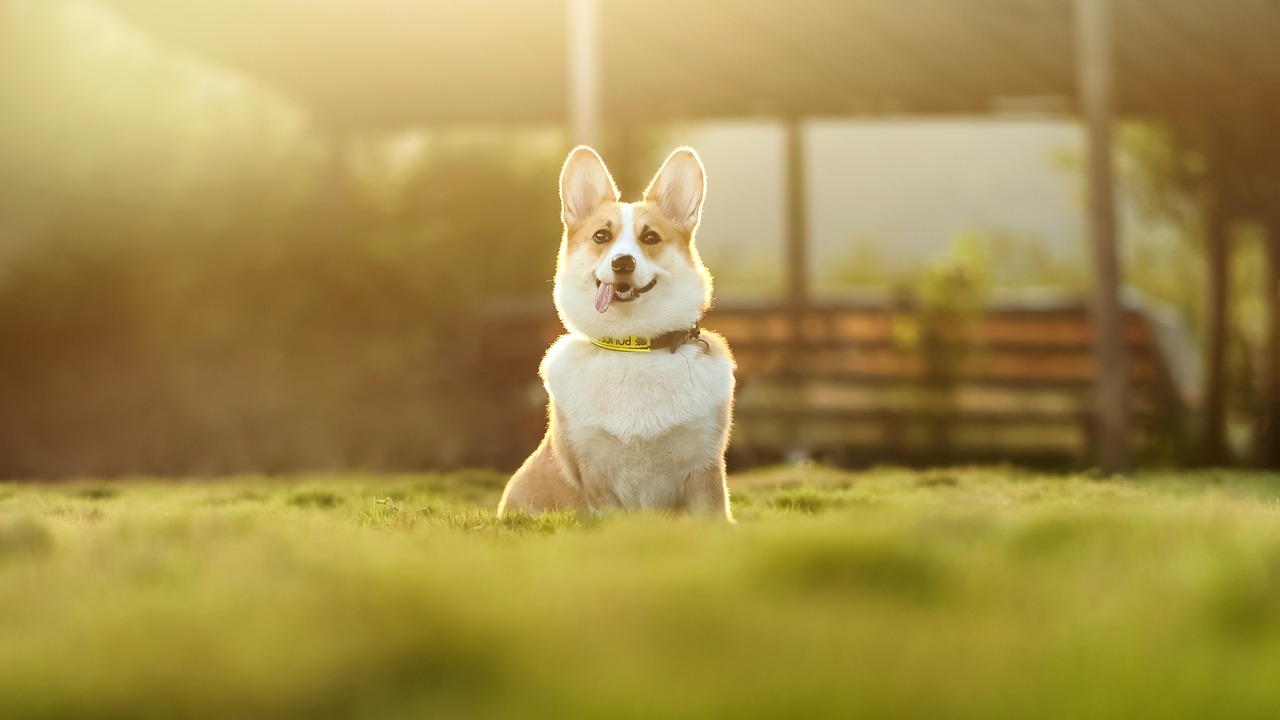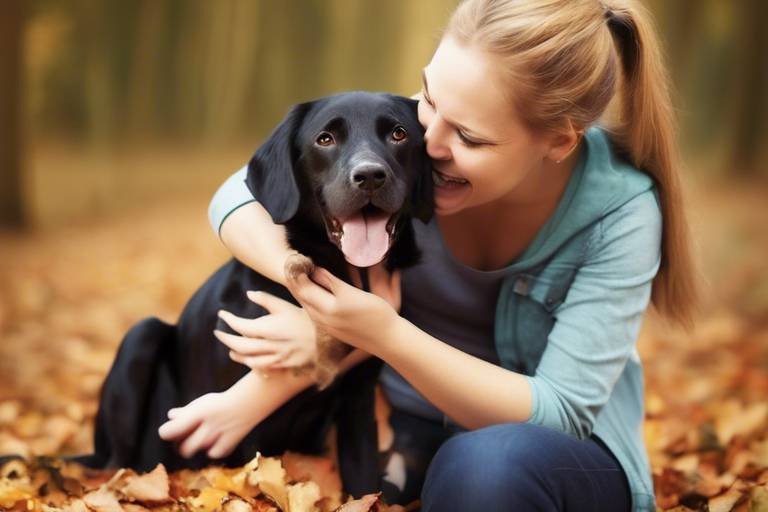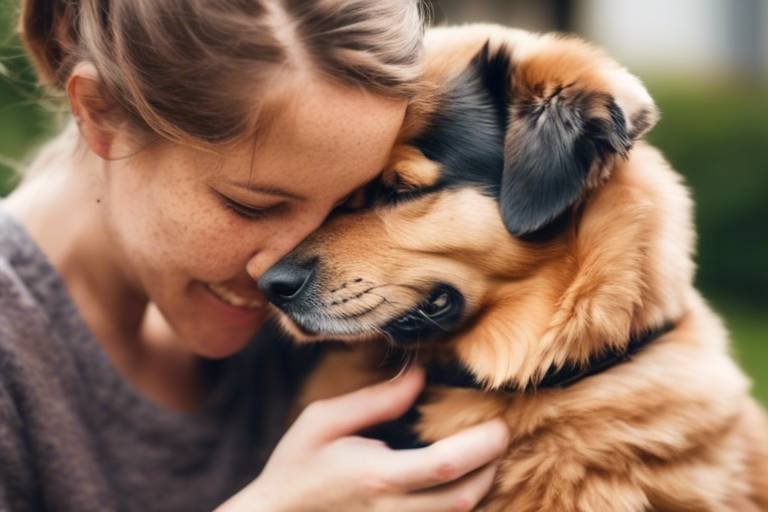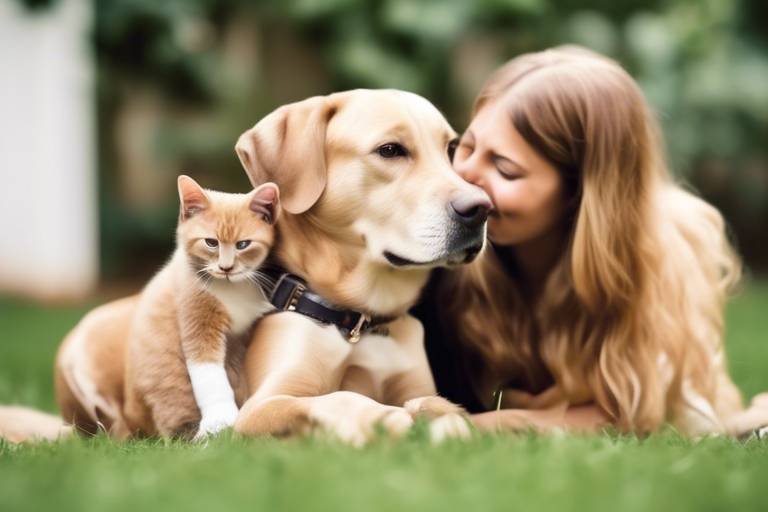The Benefits of Adopting a Senior Dog
Have you ever thought about bringing a furry friend into your life? If so, consider adopting a senior dog. While many people rush to adopt puppies, senior dogs often get overlooked in shelters. But let me tell you, adopting a senior dog can be one of the most rewarding decisions you ever make. Not only do these dogs bring immense joy and companionship, but they also offer a plethora of benefits that can enhance your life in ways you never imagined. Just think about it: a loyal companion who’s already trained and just wants to spend their golden years with you. It’s like finding a diamond in the rough!
Senior dogs, typically defined as those over the age of seven, come with a unique set of characteristics that make them special. They have a lifetime of love to give, and their calm demeanor often makes them perfect for families, individuals, and even seniors looking for a companion. These dogs may not have the boundless energy of a puppy, but they have something even more valuable: experience. They know how to love, how to cuddle, and how to be a part of your family without the chaotic energy that younger dogs often bring.
Moreover, adopting a senior dog can significantly impact your life. Imagine having a furry friend who is already house-trained, knows basic commands, and is generally more relaxed. This means less time spent on training and more time enjoying each other's company. Plus, senior dogs often have lower exercise requirements, which can be a perfect match for those who prefer a more laid-back lifestyle. It’s like having a buddy who’s always ready to chill on the couch with you after a long day!
In addition to the companionship they provide, senior dogs can also enhance your mental and physical well-being. Studies have shown that pet ownership can lead to lower stress levels, increased happiness, and even better heart health. When you adopt a senior dog, you’re not just saving a life; you’re also improving your own. It’s a win-win situation! And let’s not forget the emotional support they offer. Senior dogs have a knack for sensing when you’re feeling down and will curl up next to you, providing comfort in ways that words simply cannot.
So, if you’re on the fence about adopting a dog, take a moment to consider the incredible benefits of bringing a senior dog into your life. They may be older, but they have a lot of love left to give. And trust me, the bond you’ll create with your senior pup will be unlike any other. You’ll find joy in their quirky personalities, comfort in their companionship, and a sense of purpose in giving them a second chance at life. Why not open your heart and home to a senior dog? You might just find that they bring more happiness to your life than you ever thought possible.
- What qualifies a dog as a senior? Senior dogs are generally considered to be those over the age of seven, though this can vary by breed.
- Are senior dogs harder to train? Not at all! Many senior dogs come with established behaviors, making them easier to integrate into your home.
- How much exercise do senior dogs need? Senior dogs typically require less exercise than younger dogs, making them ideal for those with a more relaxed lifestyle.
- Can adopting a senior dog really improve my health? Absolutely! Studies show that pet ownership can lead to lower stress levels and improved mental health.

Understanding Senior Dogs
When we think about adopting a dog, our minds often gravitate towards the playful puppies, with their boundless energy and cute little faces. However, the world of senior dogs is a hidden gem that deserves much more attention. So, what exactly qualifies a dog as a senior? Typically, dogs are considered seniors when they reach around 7 years of age, although this can vary depending on their breed. For instance, larger breeds tend to age faster than smaller ones, with some small breeds living well into their teens. Senior dogs come with a unique set of characteristics that make them incredibly special companions.
First and foremost, senior dogs often have a calm demeanor. They’ve settled into their personalities and have moved past the hyperactive stage that younger dogs often exhibit. This stability can be a breath of fresh air for many dog owners, especially those who may not have the time or energy to deal with a rambunctious puppy. Imagine coming home after a long day, and instead of a whirlwind of energy, you’re greeted by a gentle wagging tail and a warm, inviting gaze. It’s like coming home to a cozy blanket on a chilly evening.
Moreover, senior dogs are often already trained and have established behaviors. They know basic commands like “sit,” “stay,” and “come,” which means that they can integrate into your home with minimal fuss. This can be particularly appealing for first-time dog owners or those who may not have the patience or time to train a younger dog. Think of it as adopting a well-read book that you can dive into without having to start from the first chapter. You get to enjoy the story without the lengthy introduction!
Another aspect to consider is the emotional depth that senior dogs bring to the table. Having spent years with humans, they possess a certain wisdom and sensitivity that younger dogs might not yet have developed. They can sense your moods and often provide comfort when you need it the most. It’s like having a wise old friend who knows just when to nuzzle you or lay by your side. This emotional intelligence can create a bond that is both profound and fulfilling, enriching your life in ways you never imagined.
In addition to their temperament and emotional support, senior dogs often have health benefits that can enhance your life. Studies have shown that owning a dog can reduce stress levels, lower blood pressure, and even encourage physical activity. With a senior dog, you might find yourself taking leisurely strolls around the neighborhood, which not only benefits your furry friend but also promotes a healthier lifestyle for you. It’s a win-win situation!
In conclusion, understanding senior dogs means recognizing their unique qualities and the joy they can bring to our lives. They may not be the flashy, energetic puppies that steal the show, but they carry a wealth of love, companionship, and stability that can transform your home into a haven. So, next time you consider adopting a dog, remember that a senior dog might just be the perfect fit for you!

Health Benefits for Owners
Owning a senior dog can be one of the most rewarding experiences of your life, not just for the furry friend you welcome into your home, but also for your own health and well-being. Did you know that having a dog can significantly reduce stress levels? When you cuddle with your senior pup, your body releases oxytocin, the "feel-good" hormone, which can create a sense of calm and happiness. This bond is especially important in our fast-paced world where stress seems to be a constant companion.
Moreover, senior dogs often encourage their owners to stay active. While they may not require the vigorous exercise that younger dogs demand, they still need regular walks and playtime, which can motivate you to get off the couch and enjoy the great outdoors. This gentle exercise not only helps keep your dog healthy but also contributes to your physical fitness. The simple act of walking can improve cardiovascular health, boost your immune system, and even enhance your mood. Think of it as a win-win situation: your dog gets the exercise they need, and you reap the health benefits too!
In addition to physical health, senior dogs provide profound emotional support. They can help alleviate feelings of loneliness and anxiety—something many of us face in today’s isolating society. There’s something incredibly comforting about having a loyal companion by your side, especially during tough times. The rhythmic sound of their breathing, the warmth of their body next to you, and their unwavering loyalty can create a sense of security that is hard to find elsewhere.
Imagine coming home after a long day, feeling drained and overwhelmed. The moment you walk through the door, your senior dog greets you with a wagging tail and eager eyes, ready to shower you with unconditional love. This simple interaction can turn your day around. Studies have shown that petting a dog can lower blood pressure and decrease cortisol levels, which are linked to stress. The act of caring for a senior dog can also provide a sense of purpose, giving you a reason to get up in the morning and engage with the world.
The companionship of a senior dog can lead to a more fulfilling life. As these dogs have typically settled into their personalities, they often form deep bonds with their owners, creating a relationship built on trust and love. This bond can provide emotional stability, making you feel less alone in a chaotic world. Whether you’re watching TV together or taking a quiet stroll in the park, the presence of a senior dog can transform mundane moments into cherished memories.
Caring for a senior dog can also bring a sense of routine and stability into your life. Dogs thrive on structure, and in return, they help their owners establish a daily rhythm. This structured routine can be incredibly beneficial for both the dog and the owner. For instance, regular feeding times, walks, and play sessions can create a comforting predictability in your day. This can be particularly advantageous for individuals dealing with anxiety or depression, as it fosters a sense of control and normalcy.
Overall, the health benefits of adopting a senior dog extend far beyond the physical. The emotional, mental, and social advantages are equally profound, making it an enriching experience for both you and your furry friend. So, if you’re considering adding a new member to your family, don’t overlook the wonderful senior dogs waiting for their forever homes. They may just be the perfect companion to enhance your life in ways you never imagined!
- What age qualifies a dog as a senior? Typically, dogs are considered seniors around the age of 7, but this can vary by breed.
- Are senior dogs harder to train? Not at all! Senior dogs often have established behaviors, making them easier to train than younger dogs.
- Do senior dogs require special care? Yes, senior dogs may need regular vet check-ups and a diet tailored to their age and health needs.
- Can senior dogs adapt to new homes easily? Yes, many senior dogs are adaptable and can thrive in new environments, especially with love and patience.
Emotional Support
When it comes to emotional support, senior dogs are like furry therapists, always ready to lend an ear—or a paw! These wise companions have a unique ability to sense our feelings and respond with unconditional love. Imagine coming home after a long day, feeling the weight of the world on your shoulders. As you walk through the door, your senior dog greets you with a wagging tail and soulful eyes, instantly lifting your spirits. It's as if they know just what you need, and they’re there to provide comfort without judgment.
Studies have shown that pets, especially senior dogs, can significantly reduce feelings of anxiety and depression. The simple act of petting a dog can release oxytocin, a hormone associated with bonding and emotional connection. This physiological response can create a calming effect, helping to ease stress and promote relaxation. Additionally, the companionship of a senior dog can combat loneliness, providing a sense of purpose and fulfillment. It's like having a loyal friend by your side, reminding you that you are never truly alone.
Furthermore, senior dogs often exhibit a gentle demeanor that makes them perfect for providing emotional support. Their calm nature can create a soothing environment, allowing you to unwind after a hectic day. They are not just pets; they become part of your family, sharing in your joys and comforting you during tough times. This bond can be especially beneficial for individuals who may struggle with social interactions or those who experience feelings of isolation.
In addition to their calming presence, senior dogs can also encourage you to engage in self-care. Taking them for walks or simply spending time together can motivate you to get outside and enjoy the fresh air. This physical activity is crucial, as it not only benefits your furry friend but also contributes to your overall well-being. The routine of caring for a senior dog can instill a sense of responsibility and structure in your life, which is often just what we need to feel grounded.
In essence, adopting a senior dog is like bringing a little piece of joy into your home. They are not just companions; they are emotional anchors that can help stabilize your mental health. So, if you're considering adding a furry friend to your life, think about the profound emotional support a senior dog can provide. They may just surprise you with the depth of their love and the comfort they bring.
- Why should I consider adopting a senior dog? Senior dogs are often overlooked in shelters, but they provide immense emotional support and companionship.
- Do senior dogs require more care than younger dogs? While they may have specific health needs, senior dogs often come with established behaviors, making them easier to care for.
- How can a senior dog improve my mental health? The companionship of a senior dog can reduce feelings of loneliness and anxiety, providing emotional stability.
- What are the benefits of adopting a senior dog for families? Senior dogs usually have predictable temperaments and lower energy levels, making them great companions for families with children.
Companionship
The bond between humans and dogs is one of the most profound relationships we can experience, and adopting a senior dog can amplify that connection in ways that are truly heartwarming. Imagine coming home after a long day, and there’s your senior pup, tail wagging and eyes sparkling, as if to say, “I’ve been waiting for you!” The companionship of a senior dog is not just about having a pet; it’s about forming a deep, meaningful relationship that can enrich your life immensely.
Senior dogs possess a unique wisdom that comes from years of life experience. They often have a calm demeanor, making them incredibly comforting to be around. Unlike their energetic younger counterparts, senior dogs tend to appreciate the simple pleasures in life—like curling up next to you on the couch, enjoying a leisurely walk in the park, or simply soaking up the sun in the backyard. This slower pace can be a refreshing change, especially for those who might feel overwhelmed by the high energy levels of younger dogs.
Moreover, the companionship of a senior dog can significantly decrease feelings of loneliness. Many people find that their senior dogs become their best friends, offering unconditional love and loyalty. The simple act of petting a dog has been shown to release oxytocin, the "love hormone," in both humans and dogs, promoting feelings of bonding and happiness. This mutual affection creates a powerful emotional support system that can help combat feelings of isolation or anxiety.
Here are a few ways that senior dogs enhance companionship:
- Unconditional Love: Senior dogs are often grateful for the second chance at life and express their affection openly.
- Calm Presence: Their laid-back nature can bring a sense of peace to your home.
- Shared Experiences: Whether it’s a quiet evening or a stroll around the neighborhood, every moment spent together strengthens your bond.
Additionally, having a senior dog around can foster a sense of purpose. Caring for a pet can instill a routine in your life, providing structure that benefits both you and your furry friend. You’ll find yourself looking forward to daily walks, feeding times, and play sessions, all of which contribute to a fulfilling lifestyle. And let's not forget the joy of simply being together—those quiet moments spent on the couch or the gentle nudges of a senior dog asking for a scratch behind the ears can be incredibly rewarding.
In conclusion, the companionship of a senior dog is a gift that keeps on giving. They offer a unique blend of love, loyalty, and tranquility that can transform your life in unexpected ways. Whether you’re seeking a quiet companion to share your days with or a loving friend to help ease loneliness, a senior dog has the potential to fill your life with joy and meaningful connection.
Routine and Stability
Bringing a senior dog into your home can profoundly affect your daily life, especially when it comes to establishing routine and stability. Dogs, much like humans, thrive on consistency. When you adopt a senior dog, you’re not just giving them a loving home; you’re also inviting a sense of structure into your life. Imagine waking up each morning to the gentle nudges of your furry friend, reminding you that it’s time for that morning walk or feeding. This simple act can bring a comforting rhythm to your day.
For many people, especially those who may feel overwhelmed by the chaos of modern life, having a senior dog can be a grounding experience. Their predictable habits and established routines can help create a sense of normalcy. For instance, senior dogs often have set times for meals, bathroom breaks, and playtime. This can be particularly beneficial for individuals who struggle with anxiety or stress, as the presence of a senior dog can make the world feel a little less chaotic and a lot more manageable.
Furthermore, the act of caring for a senior dog can instill a sense of responsibility and purpose. Knowing that your furry friend relies on you for their well-being can motivate you to maintain a regular schedule. This mutual dependence fosters a bond that enhances both your lives. You might find yourself looking forward to those daily walks, not just for the exercise, but for the companionship and the opportunity to explore the world together. It’s a beautiful cycle of support and love.
In addition to emotional stability, having a routine can lead to better health outcomes for both you and your senior dog. Regular exercise, even in shorter bursts, can keep your dog healthy and happy, while also encouraging you to stay active. This is especially important as we age; maintaining an active lifestyle can help combat health issues such as obesity and heart disease.
To illustrate the benefits of routine, consider the following table that outlines how daily activities can enhance the well-being of both you and your senior dog:
| Activity | Benefits for Senior Dog | Benefits for Owner |
|---|---|---|
| Morning Walk | Improves physical health and mental stimulation | Boosts mood and encourages physical activity |
| Feeding Schedule | Creates a sense of security and predictability | Helps establish a routine and reduces stress |
| Playtime | Enhances emotional well-being and strengthens bonds | Provides joy and reduces feelings of loneliness |
| Evening Cuddle Time | Promotes relaxation and comfort | Encourages mindfulness and reduces anxiety |
In summary, adopting a senior dog can significantly enhance your life by introducing a comforting routine and a sense of stability. The joy of having a loyal companion who thrives on structure can lead to a more fulfilling and enriched daily experience. So, if you’re considering adding a furry friend to your family, remember that a senior dog can offer more than just companionship; they can also provide the stability and routine that many of us crave in our fast-paced lives.
Socialization Opportunities
Adopting a senior dog can be a delightful experience, not just for you but for your furry friend as well. One of the most rewarding aspects of having a senior dog is the myriad of that arise. Imagine taking your senior pup for a leisurely stroll through the park. As you walk, you might notice how the gentle pace of a senior dog attracts the attention of passersby. People often stop to admire the calm demeanor of an older dog, and this can lead to spontaneous conversations with fellow dog lovers. These interactions can help forge new friendships and build a sense of community around you.
Moreover, senior dogs often have a charming way of bringing people together. Their slower, more relaxed energy can be inviting, making it easier to connect with others who share a love for animals. Picture this: you’re at a local dog park, and while the younger dogs are racing around, your senior dog is happily lounging in the shade, inviting others to join you in a conversation. This creates a welcoming atmosphere where friendships can blossom over shared stories about your pets.
In addition to casual encounters, owning a senior dog can lead to more structured socialization opportunities. Many communities have groups or clubs specifically for dog owners. These gatherings can include:
- Dog walking meetups
- Training classes focused on older dogs
- Fundraising events for animal shelters
Participating in such activities not only enriches your life but also enhances your senior dog's experience. Socializing with other dogs, even if they are younger, can help keep your senior dog mentally stimulated. It’s like a gentle reminder that they are still part of the vibrant canine world, despite their age.
Furthermore, having a senior dog can encourage you to explore new places. Whether it’s a pet-friendly café or a local dog-friendly beach, you’ll find that these outings can provide a refreshing break from your routine. Every new destination can serve as a backdrop for making memories and meeting new people who are also out enjoying time with their dogs.
Ultimately, the socialization opportunities that come with adopting a senior dog are invaluable. They not only enrich your life but also create a ripple effect in your community. By choosing to adopt a senior dog, you’re not just gaining a pet; you’re opening the door to a world filled with connections, joy, and shared experiences.
Q: Are senior dogs good for first-time dog owners?
A: Absolutely! Senior dogs often come with established behaviors and a calmer demeanor, making them great companions for first-time dog owners.
Q: How much exercise do senior dogs need?
A: While senior dogs may require less exercise than younger dogs, they still need regular walks and playtime to stay healthy and happy.
Q: What health issues should I be aware of with senior dogs?
A: Common health issues in senior dogs can include arthritis, dental problems, and heart conditions. Regular vet check-ups are crucial to monitor their health.
Q: Can I train a senior dog?
A: Yes! Senior dogs can learn new tricks and commands, and they often enjoy the mental stimulation that training provides.

Less Training Required
One of the most appealing aspects of adopting a senior dog is the minimal training required. Unlike puppies, who are often little bundles of energy with a penchant for mischief, senior dogs typically come with a wealth of experience and established behaviors. This means that when you bring a senior dog into your home, you're not just adopting a pet; you're welcoming a companion who already knows the ropes. Imagine having a furry friend who understands commands like "sit," "stay," and "come" without you having to go through the painstaking process of teaching them from scratch. It’s like hitting the jackpot in the dog lottery!
Senior dogs often have a calmer demeanor, which can be a huge advantage for families or individuals who may not have the time or energy to train a younger, more exuberant dog. They usually possess a predictable temperament, making them easier to integrate into various lifestyles. For instance, if you have children or other pets, a senior dog’s established personality can help ensure that everyone gets along harmoniously. The stability that a senior dog brings can be particularly comforting in households where routine is essential.
Additionally, senior dogs tend to be more settled in their ways, which can be a blessing for owners who prefer a more relaxed atmosphere. While puppies may require multiple bathroom breaks and constant supervision, senior dogs are often already house-trained and can be left alone for longer periods without anxiety. This means you can enjoy your day-to-day activities without constantly worrying about your furry friend getting into trouble. In essence, adopting a senior dog can be like inviting a wise old soul into your home, one who is ready to share love and companionship without the chaos of puppyhood.
As you consider bringing a senior dog into your life, remember that their life experience can be a tremendous asset. They often come with their quirks, of course, but these characteristics can make for a unique bond that you might not find with a younger dog. Just think about it: you’ll have a loyal companion who is not only grateful for a second chance but also ready to offer you their heart without the need for extensive training. It’s a win-win situation!
- Are senior dogs more difficult to train than puppies? No, senior dogs often require less training as they usually come with established behaviors and commands.
- Do senior dogs have lower energy levels? Yes, senior dogs generally have lower energy levels and may require less exercise compared to younger dogs.
- What are the benefits of adopting a senior dog? Senior dogs provide companionship, emotional support, and require less training, making them ideal for many families.
- Can senior dogs adapt to new environments easily? Yes, many senior dogs adapt well to new homes and environments, especially when given love and patience.
Established Temperament
When it comes to choosing a furry friend, one of the most compelling reasons to adopt a senior dog is their . Unlike puppies, who are often bundles of energy and unpredictability, senior dogs have typically settled into their personalities. This means that when you adopt a senior dog, you know what you’re getting. They are often calmer, more relaxed, and less likely to engage in destructive behaviors. Imagine having a companion who is already tuned into your lifestyle, ready to curl up on the couch with you after a long day, rather than bouncing off the walls!
Moreover, senior dogs have had time to learn social skills, making them more adept at interacting with people and other pets. They are often already house-trained, which can save you a lot of time and frustration. Just think about it: you can skip the puppy phase of chewing shoes and having accidents in the house! Instead, you can enjoy the companionship of a dog that knows how to behave in a home setting.
This predictability in behavior is especially beneficial for families with children or other pets. A senior dog is less likely to engage in rough play or hyperactivity that could lead to accidents. They can provide a gentle presence that teaches children empathy and responsibility. For those with existing pets, introducing a senior dog can often be smoother, as these dogs usually have a more laid-back approach to social interactions.
In essence, adopting a senior dog means bringing home a companion with a well-established personality, which can lead to a more harmonious living environment. You won’t have to guess how they will react to new situations; their past experiences have already shaped them into the loving, loyal friends they are.
- What age qualifies a dog as a senior? Generally, dogs are considered seniors around the age of 7, but this can vary based on breed and size.
- Are senior dogs good with children? Yes, many senior dogs are very gentle and patient, making them excellent companions for children.
- Do senior dogs require special care? While they may need regular vet check-ups and a tailored diet, senior dogs can enjoy a fulfilling life with proper care.
- Can senior dogs still learn new tricks? Absolutely! Senior dogs are capable of learning new commands and behaviors, although their pace may be slower than that of a younger dog.
Lower Energy Levels
One of the most appealing aspects of adopting a senior dog is their . Unlike their younger counterparts, senior dogs often have a more laid-back approach to life. This doesn’t mean they don’t enjoy playtime or short walks, but their exercise needs are generally less demanding. This can be a huge advantage for individuals or families who may not have the time or energy to keep up with a high-energy puppy. Imagine the joy of having a furry friend who is content to lounge by your side while you read a book or watch your favorite show!
Senior dogs typically require shorter, more manageable walks and play sessions, making them ideal companions for those who lead a more relaxed lifestyle. For instance, a senior dog may only need a couple of short walks each day, allowing you to enjoy your time together without feeling overwhelmed by the need for constant activity. This can also lead to a more peaceful home environment, where both you and your dog can unwind and enjoy each other’s company.
Additionally, their calmer demeanor can be especially beneficial for families with young children or elderly members. Senior dogs are often more patient and less likely to engage in rambunctious play, which can help create a safer atmosphere. This predictability in behavior can be a significant relief for pet owners, as you won’t have to worry as much about your dog knocking over furniture or accidentally hurting someone during a playful moment.
To illustrate the differences in energy levels, consider the following table:
| Age Group | Typical Energy Level | Exercise Requirements |
|---|---|---|
| Puppy (0-1 year) | High | 1-2 hours of play and exercise daily |
| Adult Dog (1-7 years) | Moderate | 1 hour of play and exercise daily |
| Senior Dog (7+ years) | Low | 30 minutes to 1 hour of light exercise daily |
This table highlights the stark contrast in energy levels across different age groups. By adopting a senior dog, you can enjoy the companionship of a pet without the intense physical demands that come with younger dogs. They can still provide love, loyalty, and joy, but in a way that fits more seamlessly into your lifestyle.
In conclusion, lower energy levels in senior dogs make them an excellent choice for many pet owners. They offer the perfect balance of companionship and calmness, allowing you to enjoy the benefits of having a dog while keeping your daily routine manageable. So, if you’ve been considering adding a furry friend to your life but are worried about the commitment of a high-energy pup, a senior dog might just be the perfect fit for you!
- What is considered a senior dog? Generally, dogs are considered seniors around the age of 7 years, but this can vary based on breed.
- Do senior dogs require special care? Yes, senior dogs may need special diets, regular vet check-ups, and more comfortable living conditions.
- How can I help my senior dog stay healthy? Regular vet visits, a balanced diet, and moderate exercise can help keep your senior dog healthy.
- Are senior dogs good with children? Many senior dogs are very gentle and patient, making them great companions for kids.

Making a Difference
Adopting a senior dog is not just a personal choice; it’s a decision that ripples outwards, creating a wave of positive change in both the dog’s life and the community. When you bring a senior dog into your home, you’re not just gaining a loyal companion; you’re also giving a deserving animal a second chance at life. Many of these dogs have been in shelters for extended periods, often overlooked because of their age. By choosing to adopt a senior dog, you are making a profound statement: that every life is valuable and worth living to the fullest.
Moreover, adopting a senior dog can inspire others to consider the beauty of older pets. Imagine the conversations you’ll have with friends and family when they see the joy your new companion brings. You could be the spark that ignites a movement! The more people who adopt senior dogs, the more shelters can focus on finding homes for other animals in need. It’s a beautiful cycle of compassion and community support.
In addition to providing a loving home, adopting a senior dog can also help alleviate the burden on local shelters and rescue organizations. These facilities often face overcrowding, and by choosing to adopt a senior dog, you’re directly contributing to their efforts. You’re helping to free up space for other animals who may need shelter, care, and love. This act of kindness creates a domino effect, allowing more animals to receive the help they desperately need.
Furthermore, let’s not forget the joy that senior dogs bring into our lives. They come with a lifetime of love and wisdom, often possessing a calm demeanor that can be incredibly soothing. Their playful spirit, despite their age, can remind us to cherish the little moments of joy in life. By opening your home to a senior dog, you are not just changing their life; you are enriching your own.
In summary, adopting a senior dog is a decision that holds immense power. It’s about making a difference, not just for the dog but for the community as a whole. You are creating a legacy of compassion, encouraging others to follow suit, and fostering a network of support for all animals in need. So, if you’ve ever considered adding a furry friend to your family, why not choose a senior dog? The rewards are immeasurable, and the impact is lasting.
- Why should I adopt a senior dog? Senior dogs often have established behaviors and require less training, making them easier to integrate into your home. They also provide unmatched companionship and emotional support.
- What health benefits can I expect from owning a senior dog? Caring for a senior dog can lead to reduced stress levels, increased physical activity, and improved mental health.
- How can adopting a senior dog impact my community? By adopting, you help alleviate overcrowding in shelters, allowing them to focus on finding homes for other animals in need.
- Are senior dogs good for families with children? Yes! Senior dogs often have a calmer temperament and can be wonderful companions for children, teaching them about empathy and responsibility.
Frequently Asked Questions
- What qualifies a dog as a senior?
A dog is generally considered a senior when they reach around 7 years of age, although this can vary by breed. Larger breeds tend to age faster, while smaller breeds may remain youthful for longer. Senior dogs often display unique characteristics that make them special companions, such as a calmer demeanor and a wealth of life experience.
- What are the health benefits of adopting a senior dog?
Adopting a senior dog can significantly improve your mental and physical health. Caring for a senior dog can reduce stress levels, increase physical activity, and provide emotional support. The routine of walking and playing with your dog can also lead to a more active lifestyle, which is beneficial for both you and your furry friend.
- Do senior dogs require a lot of exercise?
Not necessarily! Senior dogs typically have lower energy levels than their younger counterparts, which means they often require less exercise. This makes them ideal for individuals or families who may not have the time or ability to engage in high-energy activities. A few short walks and some playtime can keep them happy and healthy.
- How do I know if a senior dog is right for me?
If you're looking for a loving companion who is already trained and has a settled temperament, a senior dog might be the perfect fit for you. They often come with established behaviors, making the transition into your home smoother. Plus, the bond you can develop with a senior dog is incredibly rewarding.
- What can I do to help a senior dog adjust to a new home?
To help a senior dog adjust, create a calm and welcoming environment. Provide a comfortable space for them to relax, establish a routine for feeding and walks, and be patient as they acclimate to their new surroundings. Positive reinforcement during training will also help them feel secure and loved.
- Can adopting a senior dog make a difference in my community?
Absolutely! By adopting a senior dog, you're not only giving that dog a second chance at life but also helping to alleviate overcrowding in shelters. Your decision can inspire others to consider adopting senior pets, creating a ripple effect that benefits both animals and the community.



















